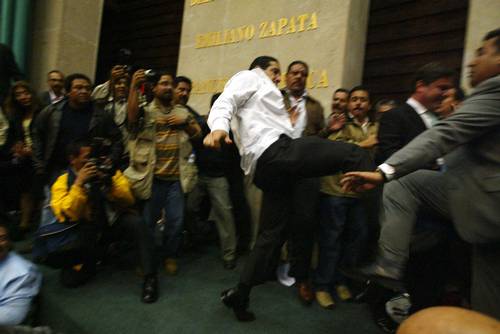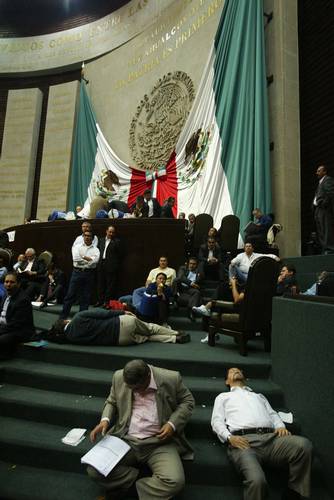A recent NYT piece is woefully wrong about what’s wrong with higher education. Hickok makes some claims that probably don’t accurately describe the situation at most public schools, and certainly is nothing like my experience at Tech. He says:
Faculty members decide what they want to teach and when they want to teach, if, indeed, they teach at all. This is particularly true regarding undergraduate instruction, which is something of an afterthought on many campuses. Faculty members typically spend fewer than 200 hours a year in the classroom. That amounts to just five 40-hour weeks.
In my first 3 years on the tenure-track at Tech, I have taught 2 classes every semester except one. I also taught 8 different classes in those three years and all but 2 were required or core elective classes for either our undergraduate or graduate degree. [I’m not even counting the 2 new courses that I taught in Spanish during my Fulbright year.] The two electives were: Latin American political economy (hardly superfluous) and Latin American popular culture and politics as part of an 8 week experiential learning program in Argentina and Brazil the summer after my first year at Tech.
I should admit, from what I understand from my collegues elsewhere, I have perhaps taught several more different course preparations than the average political science professor at a research 1 institution. I am almost certainly one of the few at a research 1 school who has taught in nearly every subfield of my discipline (American, IR (IPE), Comparative, and Methods) at the undergrad level and in two subfields at the graduate level, neither being the primary field in which I conduct my research.
So, did I choose to teach so many different classes? Not really, but my department needs those courses taught, and I am able to cover many different areas, so they ask me to. Only one of the classes that I teach regularly is a class that I would be expected to teach in any political science department at a R1 school: Latin American politics. For all the rest, they would have specialized faculty who would teach in those areas, rather than me.
Do I get to choose when I teach? No. I have taught at 8am. I also teach one class every semester from 6 to 9 at night for our graduate program. This semester, I am teaching it on a Thursday night, arguably the worst slot for a statistics class because everyone is dog tired by then and too exhausted to read/prepare for class. And, I miss Earl and The Office on Must See TV. I would much rather teach that class 3-6pm on Mondays when everyone is fresh and happy from the weekend.
For each of those 8 different classes, I had to develop the course and reading list since we don’t teach a cookie cutter curriculum like they do in many high schools. I suspect that few professors, even those teaching classes like American Government where the textbooks come with ample testbanks and supplementary materials, actually just use the powerpoints or slides that come with the textbook. I sure hope Hickok isn’t suggesting we should “teach to the test” in college and all just some canned curriculum.
This fall (the 4th on my tenure clock), I am teaching yet another new preparation, but this time by my choosing. I am team-teaching with an Economics faculty memberour senior seminar for joint International Affairs and Economics majors. I offered to do this because
1) no one else wanted to do it,
2) I get along well with the Econ professor, who I would also count as a friend,
3) the Econ professor and I quickly agreed on what we wanted to cover in the class,
4) I want my research to move more in the direction of the political economy work we are covering in the class, and
5) I see it as an opportunity to have a class that I will now be able to teach repeatedly (which will reduce the likelihood that I have to teach some other new or less desireable course).
Hickok also argues:
Take a look at what passes for subjects of scholarly and instructional focus on campuses. Should taxpayer dollars really go to underwrite courses in such things as the history of comic book art? Policy makers and tuition payers need to be made aware of what sorts of courses institutions consider appropriate to fulfill core academic requirements, if anything resembling an academic core even exists. And there needs to be a greater emphasis on teaching students what they need to know, rather than what faculty want to talk about.
Most of my discussion above covers these points. Anyone can look at our curriculum online. It’s not hidden. We teach our students what they need to know. I rarely get to talk about what I want to talk about. (I’m so desparate to talk about the Mexican election, that I’m going to have to go to other people’s classes to do it because I’m stuck teaching something removed from my research interests.)
He also claims:
Colleges and universities need to be able to explain why they charge the tuition they charge, what their graduation rates are, what they feel constitutes an educated person and how they propose to get first year students from here to there. The various college rating systems and publications are entertaining and interesting to read, but they don’t provide the sort of objective data tuition payers need to make informed decisions.
Let me start by saying that I think that many of the ranking systems have serious flaws. At the same time, even the US News and World Report rankings punish a school if their completion rate is low. In fact, Georgia Tech used to be punished heavily because many students left Tech once they realized they didn’t want to be engineers. In response, the Institute decided to develop the social sciences into degree granting departments to boost our retention rate. Georgia Tech has only been offering undergraduate degrees in the social sciences since 1990. International Affairs now has 400 majors (some jointly with Modern Languages or Economics) out of 13,000 undergraduates. It seems that this is evidence that universities do respond to the incentives created by (even flawed) ranking systems to improve student satisfaction.
Overall, the title of the NYT post implies that Hickok would have universities adopt some objective measures of student performance at the end of their college education, a la standardized testing at the end of secondary school. Clearly that policy has not done much to improve public education, and in fact, has done much to hurt students who no longer are able to think critically or write well. Once universities begin “teaching to the test,” families will really not be getting their money’s worth and the U.S. will fall further behind the rest of the world in innovation and development.
So, what is wrong with U.S. unversity education? Well, there’s probably too much emphasis put on sports, but then again that makes money for universities that they can’t get from their state legislatures. Then, there’s the problem that they have to build multi-million dollar recreation centers to recruit students instead of spending that money on faculty salaries or classroom facilities. I’d say a big problem is that many families don’t want (or can’t afford) to pay what a good college education costs. Another problem is that universities compete with one another for the favor of 18 year olds, who often (due to their age) are short-sighted and looking for something other than education. So universities woo these students with rec centers, luxury dorms, big sporting events, and other perks that have all to do with student life and little to do with academic learning.



